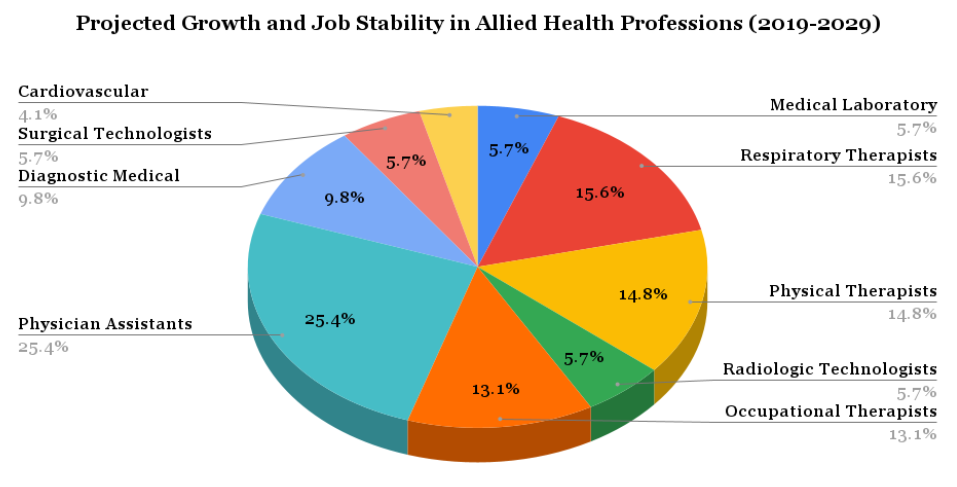Allied Health Professions are integral to the healthcare industry, playing a pivotal role in bolstering the efforts of doctors, nurses, and various other healthcare professionals. Occupations within the realm of Allied Health cover a broad spectrum of duties, ranging from administering medical tests to assisting individuals with physical therapy.
In recent years, the significance of these roles has heightened as they make substantial contributions to the holistic well-being of individuals. However, are you acquainted with the numerous benefits they offer? If not, this article endeavors to elucidate why embarking on a career in allied health professions can be an excellent decision.
Benefits of Careers in Allied Health
- Varied Career Opportunities
One of the most enticing aspects of Allied Health Career Benefits is the array of career paths available. From medical laboratory technologists and respiratory therapists to physical therapists and radiologic technologists, there exists a diverse range of specialties to explore. This diversity enables individuals to discover a niche that resonates with their interests, skills, and passions.
- Abbreviated Education and Training
In contrast to the extensive schooling required for physicians, many allied health professions offer shorter educational pathways. While specific requirements vary depending on the specialty, numerous programs can be completed in two to four years. This enables aspiring allied health professionals to enter the workforce sooner, potentially earning a steady income while their counterparts pursuing more traditional medical careers are still in school.
- Job Security and Future Growth
The healthcare industry is renowned for its stability, and allied health professions are no exception. With an aging population and advancements in medical technology driving increased demand for healthcare services, job prospects for allied health professionals remain robust. According to the Bureau of Labor Statistics, employment in healthcare occupations is projected to grow 15% from 2019 to 2029, significantly outpacing the average for all occupations.

- Fulfilling Work
Allied health professionals have a direct impact on patient care and outcomes, often developing close bonds with those they assist. Whether it involves aiding a patient in recovering mobility post-injury, conducting diagnostic tests for illness detection, or administering treatments to enhance quality of life, careers in Allied Health Professions are profoundly fulfilling. Knowing that one is effecting tangible improvements in the lives of others can be immensely gratifying.
- Advancement Opportunities
Allied Health Jobs provide ample avenues for career progression and professional growth. Through gaining experience and pursuing further education, individuals can venture into advanced practice roles, managerial positions, educational roles, or even transition into healthcare administration or research. The opportunity for continuous learning and development within the field ensures that those in Allied Health Careers can forge fulfilling and meaningful professional paths over the long term.
- Work-Life Balance
While healthcare can be demanding, many Allied Health Professions offer more predictable schedules and better work-life balance compared to certain other healthcare roles. Depending on the setting and specialization, allied health professionals may enjoy greater control over their hours, enabling them to harmonize their professional commitments with personal interests and familial obligations.
- Contribution to Interdisciplinary Teams
Healthcare delivery increasingly relies on collaborative efforts, with interdisciplinary teams pooling their expertise to deliver comprehensive patient care. Allied Health Jobs play vital roles within these teams, bringing their unique skills and perspectives to the table. Collaborating with physicians, nurses, social workers, and other healthcare professionals not only enhances patient outcomes but also fosters a sense of camaraderie and mutual respect among team members.
Education and certification requirements

Challenges within the Allied Health Professions
Despite the benefits offered by Allied Health Jobs, they also encounter various challenges that affect patient care and overall well-being. Like any field, these professions confront several obstacles that influence both professionals and the quality of healthcare services.
Here are some of the primary challenges encountered in Allied Health Career Opportunities:
- Staffing Deficiencies
One of the most pressing issues in Allied Health is the scarcity of qualified professionals. Despite the constant demand for healthcare services, shortages in specific professions like physical therapy or respiratory therapy can result in increased workloads and potentially compromise patient care.
- Academic Obstacles
The educational prerequisites for many Allied Health Career Opportunities can be formidable. Lengthy and rigorous programs, combined with the necessity for clinical experience, may deter individuals from pursuing these careers. Additionally, limited access to educational programs in certain regions exacerbates workforce shortages.
- Lack of Recognition
Allied Health Career Opportunities often contend with a lack of visibility and acknowledgment compared to other healthcare roles such as physicians and nurses. This lack of recognition can lead to lower job satisfaction, diminished opportunities for career advancement, and difficulties in advocating for fair compensation.
- Collaboration Among Professionals
While collaboration is vital in healthcare, establishing effective interprofessional collaboration can be challenging. Allied Health Professionals may encounter communication barriers and teamwork issues with physicians and nurses, impacting the seamless delivery of patient care.
- Fatigue and Stress
Allied Health Professionals, like many healthcare workers, may experience elevated levels of stress and burnout. Heavy workloads, demanding schedules, and emotional challenges associated with patient care can contribute to mental health issues and job dissatisfaction.
- Progress in Technology
While technology can enhance patient care, keeping pace with rapidly evolving technologies presents a challenge. Allied Health Professionals require ongoing training to adapt to new equipment and techniques, and healthcare institutions may face financial constraints in keeping up with technological advancements.
- Regulatory Changes
The healthcare industry is subject to frequent regulatory modifications, affecting the practice of Allied Health Professionals. Adapting to new regulations, licensing requirements, and compliance standards can be time-consuming and add administrative burdens.
- Diverse Patient Populations and Cultural Proficiency
The diverse patient population served by Allied Health Professionals necessitates cultural competence. Understanding and addressing the unique needs and perspectives of patients from various backgrounds can be challenging, and inadequate cultural competence may impact the quality of care provided.
- Economic Strain
Allied Health Professionals, particularly in outpatient settings, may encounter financial pressures due to changes in reimbursement policies and insurance coverage. These financial constraints can limit resources for professional development and may affect job satisfaction.
- Awareness in the Public Sphere and Advocacy
Limited public awareness of the roles and contributions of Allied Health Career Opportunities can impede advocacy efforts for necessary resources, professional recognition, and policy changes that benefit the entire workforce.
Conclusion
A career in allied health professions presents numerous advantages, including diverse career opportunities, shorter education pathways, job stability, rewarding work, and opportunities for advancement. For individuals passionate about healthcare and dedicated to making a positive impact in others’ lives, pursuing a career in allied health offers a fulfilling and meaningful path to explore.




